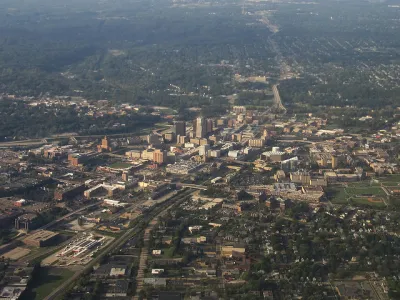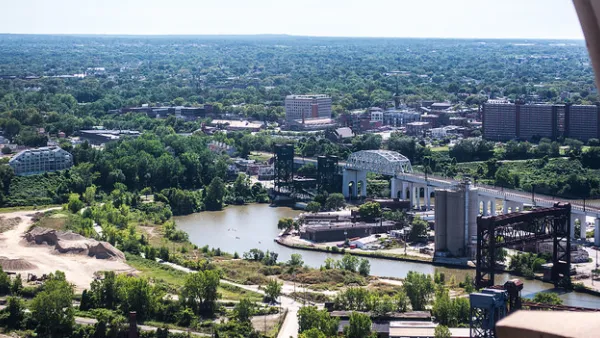The Lincoln Institute of Land Policy is launching the Legacy Cities Initiative to provide a network of support for cities of the country's industrial past.

A new legacy cities initiative launched this week with goals for supporting policy makers, civic leaders, and other stakeholders in cities with industrial pasts and fading middle class prosperity, sometimes called Rust Belt cities. Legacy cities are home to nearly 17 million people and a collective economy of $430 billion.
The Lincoln Institute of Land Policy is launching the initiative, with a new website and a request for expressions of interest in participation in the national network of legacy city community leaders.
According to an article by Emma Zehner, Allison Ehrich Bernstein, and Will Jason that announces the new initiative, the initiative will help community leaders in legacy cities "build on their city’s strengths and create a more equitable, sustainable, and prosperous future."
The Legacy Cities Initiative will offer webinars, peer exchanges, new research, and a community of practice of select leaders, who will meet regularly beginning in January 2021, according to the announcement.
FULL STORY: Lincoln Institute of Land Policy Launches Legacy Cities Initiative

National Parks Layoffs Will Cause Communities to Lose Billions
Thousands of essential park workers were laid off this week, just before the busy spring break season.

Retro-silient?: America’s First “Eco-burb,” The Woodlands Turns 50
A master-planned community north of Houston offers lessons on green infrastructure and resilient design, but falls short of its founder’s lofty affordability and walkability goals.

Delivering for America Plan Will Downgrade Mail Service in at Least 49.5 Percent of Zip Codes
Republican and Democrat lawmakers criticize the plan for its disproportionate negative impact on rural communities.

Test News Post 1
This is a summary

Test News Headline 46
Test for the image on the front page.

Balancing Bombs and Butterflies: How the National Guard Protects a Rare Species
The National Guard at Fort Indiantown Gap uses GIS technology and land management strategies to balance military training with conservation efforts, ensuring the survival of the rare eastern regal fritillary butterfly.
Urban Design for Planners 1: Software Tools
This six-course series explores essential urban design concepts using open source software and equips planners with the tools they need to participate fully in the urban design process.
Planning for Universal Design
Learn the tools for implementing Universal Design in planning regulations.
EMC Planning Group, Inc.
Planetizen
Planetizen
Mpact (formerly Rail~Volution)
Great Falls Development Authority, Inc.
HUDs Office of Policy Development and Research
NYU Wagner Graduate School of Public Service





























